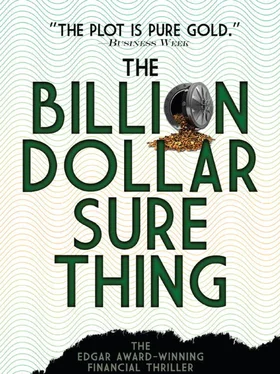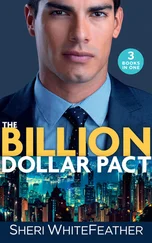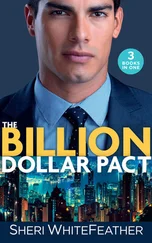“How could he intrigue you? You’ve never met.”
“Of course not, but what I mean is that it intrigues me that a guy could get so worked up about business that even you could not get him worked up in bed.”
“I told you. He had something very big on his mind.”
“How could anything be that big?”
“He said that the meeting of those two men he saw together in London could mean that something very very important was going to happen. You know, with gold and dollars and all that stuff.”
“You mean the American Secretary of the Treasury?”
“Yes and that other one.”
“From what bank was he again?”
“In English I don’t know. But in French it’s the Banque pour le… I forget. He called it BIZ or BEEZ or something like that.” Then she paused and gave Rosen a curious look.
“But why,” she continued, “are you so interested?”
“Well, I mean he is more or less your boyfriend, isn’t he?”
“In a way. But not in any way that has anything to do with us.”
“I’m not so sure. I mean, you can hardly be happy with a man who is impotent.”
“I never said that. In fact, that was the first time that such a thing happened.”
“Sure,” said Stanley.
“Now you listen to me. You hardly think that I would become involved with a man who couldn’t even—” She was obviously insulted.
“Claudine,” interrupted Rosen, “let’s change the subject. I’m sorry. You’re right. It’s hardly any concern of mine. I just hope that you’ll be seeing a lot more of me in the future than that Swiss jerk.”
The fact was that during the next four hours they saw quite a bit of each other, often from some of the most amazing angles. It was just before dawn when they sank into an exhausted sleep.
The first thing Stanley did when he woke up around noon was to look at the date on his watch. October 23. Time to get back to work.
EXACTLY six days later, on October 29, George Bernoulli had just straightened out his desk at the headquarters of the Special Branch of the Swiss Federal Police in Bern ready to leave for lunch, when the phone rang.
“Herr Doktor Bernoulli?” asked the metallic voice.
“ Jawohl , am Telefon. ”
“One moment please, Herr Doktor. You have a call from the Federal Council chambers.”
The call was extremely brief. The minister of finance wanted to see Bernoulli within the shortest possible time—immediately, if convenient. It was.
The quickest way was to walk. Fifteen minutes later Bernoulli entered the office of the minister. The latter was not alone. He had two additional members of the Federal Council with him. After the usual round of handshakes, the finance minister, Jakob Gerber, took over.
“Herr Bernoulli, please accept our apologies for the short notice. But we have a problem that is quite urgent, and most delicate. I think you are the man to help us.”
Gerber gave Bernoulli that super-earnest look which seems to be a prerequisite for high public office, no matter what the country.
“Thank you, sir. I would, of course, be most happy to help in any way I possibly can,” said Bernoulli, the obedient servant.
“Good. Let me outline the situation. It apparently started in Rome last month, at the IMF meeting. The Germans, French, and Japanese came to a decision that if the United States was going to refuse to restore gold-dollar convertibility, they would force the issue by banding together into a gold bloc. Feelers were put out to us to join in, but in view of our neutrality we of course abstained. For this whole project would have amounted to nothing short of an open rebellion against the United States. In addition, I personally doubt whether it could have been carried off anyway. But that is now a moot point. For somehow the Americans got wind of the whole affair.”
Gerber paused. He liked to formulate his thoughts quite precisely before speaking. “Well, as I said, the American delegation apparently got tipped off, and nothing short of a miracle happened. The president took the decision to restore the dollar-gold link by revaluing the official price of gold to $125 per ounce. This is extremely good news, of course. And you are probably wondering how we have come to know about it.”
Bernoulli had no choice but to nod.
Gerber continued: “For good reasons, the president decided to put the secretary-general of the Bank for International Settlements in the picture. Apparently the Americans realized that it would be absolutely essential to inform Bollinger in advance—you know Bollinger, of course—since the BIS will have to assume a good share of the responsibility for steadying the foreign exchange markets, after the announcement is made. By the way, the firmly established revaluation date is November 8. In just over a week.”
Gerber paused again. In contrast to the other six members of the Federal Council, who together represented the collective presidency of Switzerland, he was not a professional politician. He came from an industrial background and was known to be a man who could make tough decisions quickly. In spite of the fact that he had held the governmental post for over two years, he still appeared more than slightly uncomfortable in the company of some of his colleagues. The associate on his left, the minister of the interior, was best known for his ability to yodel at the conclusion of rural gatherings, which were much more noted for their alcoholic than political content. The man on his right, the minister of justice, was an ex-part-time university professor. He had no such claim to fame in the yodeling field, or for that matter, in any other. The law required seven men on the Federal Council, and he was simply the seventh. He could, however, smoke a pipe with a certain amount of élan.
The finance minister went on. “Obviously I still have not fully explained why we are involved. For the Americans demanded, and received, a pledge of absolute secrecy from Bollinger. Well, an accident happened. Upon his return from London, where he met with the American Secretary of the Treasury, Bollinger put his copy of the gold plan into a small safe which he maintains at his home. This was not all that unusual. Bollinger told me that he often brings documents home, especially over weekends, as we all do, I suppose. In this instance there was a special incentive for Bollinger to use his private facilities. He did not want any of his associates at the bank—most of them foreigners, as you know—to stumble upon this document, for obvious reasons.
“Somebody tampered with the safe a week later—which was the day before yesterday. Bollinger found himself in a most difficult dilemma. If somebody had deliberately taken illegal steps to get hold of the plan and maliciously leaked its contents, the result would probably be the biggest monetary explosion the world has ever seen. Even if the Americans now changed the plan, documentary evidence that it existed would produce such mass exodus from the dollar, and flight into anything else, ranging from marks to yen to lire, from Swiss common shares to South African gold mines, that possibly every bank in the free world, as well as all securities and commodities exchanges, might have to close their doors for weeks, maybe months. It would mean total chaos. I think that should be obvious. The German government leaked their exact thoughts about letting the mark float in May, 1971. The ultimate result was that in the final thirty-five minutes before they stopped accepting dollars, they took in over one billion! Just imagine what would happen under these circumstances.”
The room remained completely silent.
“One possibility is that somebody is out to sabotage the dollar, once and for all. The other possibility is that this is the start of a highly organized criminal effort. You can imagine what this information could be worth to a speculator, or a group of speculators. An absolutely staggering amount. Then there is still the chance that a freak coincidence is involved. Perhaps some petty thief took a crack at this safe hoping for the best and, finding nothing of value, took along what struck him as the most impressive set of papers. For Bollinger claims that no one, absolutely no one, could possibly have known that a dossier of this importance was in his possession. But in any case, it was gone.
Читать дальше












